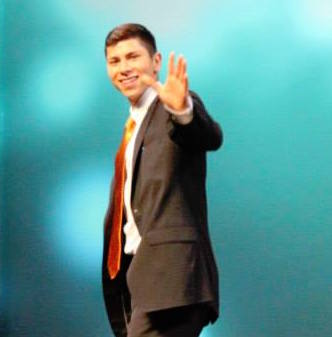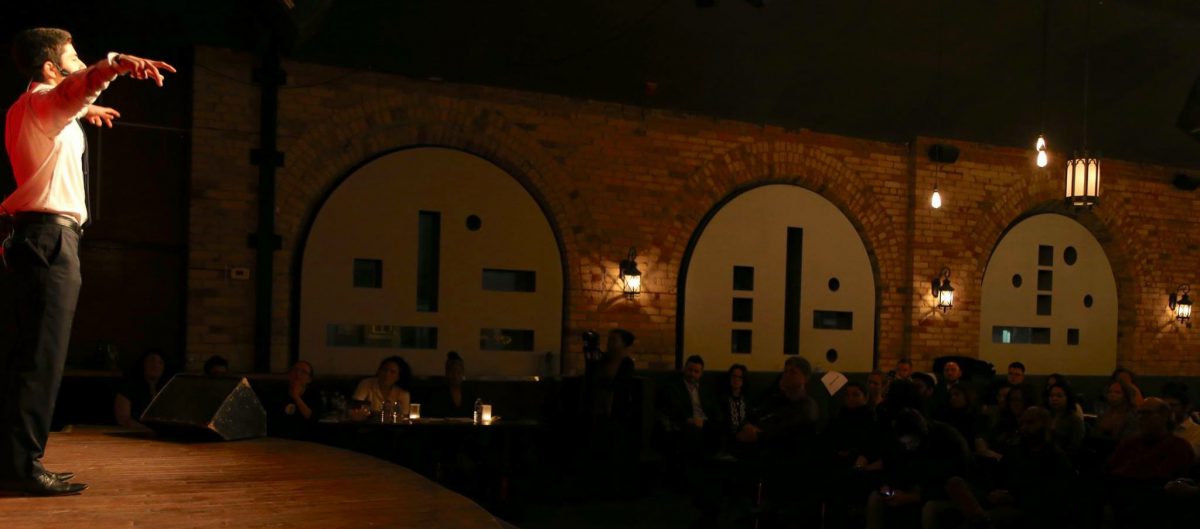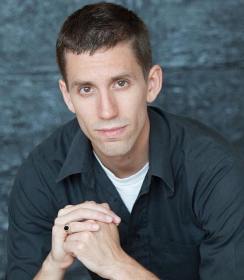The road to the World Championships of Public Speaking is riddled with obstacles. In fact almost 300,000 speakers from across the world come together every year desperately yearning to stand on stage as the worlds best speaker. My guest today was one of the .0003% of speakers who’ll ever cross the world stage and fortunately for us, he’s here to share how we can too.

In 2017, John Andrews became just the 11th person in the history of District 60 to compete in the final round of the World Championships. Recognized by Toastmasters from around the world, he’s currently finishing up his World Class Speech Coaching Certification so that he can share his insight with the world. If you’re not contest ready, John’s tips will surely help bridge that gap.
(If you’d prefer these tips in video, click this link)
World Class Speech Preparation
As you can imagine, no serious competitor writes a world class speech overnight. John believes that most world championship speeches will take a minimum of 3-4 weeks to write. In our interview John said, “Speech prep starts the day the last competition ends.”
Therefore, if you haven’t already started to prepare for the 2019 International Speech competition, you’re behind! You mind be thinking, “that’s crazy” or “that’s unrealistic” and to that, John would say you’re right. Unless, you want to be the best. As a speaker who’s gleaned a lot of insight from past World Champions like Darren LaCroix and Craig Valentine, John and other serious competitors hold themselves to a higher standard.
John recalled a lesson he learned early in his speaking journey from Darren, “When Darren first started speaking, he joined 4 Toastmasters club. In the early days he would drive 2 hours both ways to do a 10 minute stand up comedy performance. He was obsessed with stage time.”
So when I asked John for his best advice for ambitious speakers who want to be world class, he said that nothing beats stage time. Nothing beats a commitment to excellence. Nothing beats hard work. In addition, he reminds us that regardless of the goal, there will always be someone who wants it a little more than we do. Someone willing to put in more hours, study harder and grind longer.
If you have talent, good for you. But talents not enough in this game. Like my good friend Kevin Rempel always says,
“Hard work beats talent when talent doesn’t work hard.”
John also recommended a few rapid fire tips to help set you up for success in the next competition season:
- Record your speech on video. Video doesn’t lie. All of the nuances and subtleties that are missed during feedback from friends and fellow Toastmasters will be captured on video. Ensure your improvement process is systematic and objective. Take the time to review the video and look for where your body language distracts from your message. For where you could add more humour or where you can make the slightest improvements in delivery, structure or content. Check out my video about videotaping yourself here.
- Follow the speech objectives. Many Toastmasters in John’s opinion are moving from speech to speech and manual to manual for external validation. Not for the sake of learning and their personal development. If you want to be world class like John, you’ll need to upgrade your skills. How do you do that? Follow closely the curriculum Toastmasters has laid out for us! The projects have tips, objectives, and a systematic approach to our improvement as communicators and leaders. The next speech you give, follow the manual to the letter, you’ll be surprised how much more you grow.
- Have a strong message. If there was only one piece of advice John could give to speakers it would be this one. John believes that having a strong message is the most important factor in your public speaking success. All of the work we do at Toastmasters to develop your skills in delivery, content and structure are only to back up and support your message. They are not the show, the message is the show. Focus all of your time and efforts into coming up with a message that is powerful and can change the world. If you have a weak message, it’s likely no level of speaking competence can bring you back from the grave you’ve just personally dug.
Lessons From Death
I, like the Stoics, are strong believers that death should be seen as motivation. Death is not something to be avoided or fought, but embraced. And in doing so it’s actually a formula for great insights, breakthroughs and wisdom. John Andrews, is no different. After years of being a Licensed Funeral Director, he’s seen it all.
“There were days,” John recalled, “where I’d wake up in the morning and think to myself, ‘I wish my apartment was bigger or I wish the ceilings were higher (ditto brother) or I wish the appliances were nicer,’ and then after a long day at work I’d come home and be so grateful for everything I had in my life. Not having to bury my child or my parents that day was enough for me to realize how beautiful my life was and how much I really have.”
Remembering that we are mortal, that any given day could be our last, or our parents last, or our best friends last, should be motivation enough to squeeze every last drop out of this existence we call life. Whether we’re a stay at home mom, a new Toastmaster with the dream of going to the World Championships or a student studying in University, our days are numbered. Tomorrows, never guaranteed.
My best friend and roommate Iain, is a constant reminder to me of this truth. And although it sounds morbid or pessimistic, I hope you can learn from John’s lessons from death and put your best foot forward every day. To get obsessed about your goals, to love and appreciate your family like you never have and to be true to yourself in this short life.
I know I will.
John’s Do This Directives.
- Get a coach. John’s had countless coaches throughout his life and many of the tips above are enough to support new speakers, those that want to go pro need a coach. Wether you want to see your blind spots, challenge yourself beyond what you thought possible or help fast forward your trajectory to success, a coach is indispensable.
- Don’t force your contest prep. Give yourself enough time! As we mentioned before, world class speeches aren’t written overnight. Don’t force your prep and ensure that you’re giving yourself 3-4 weeks to fully develop your contest speech.
- Get around humour. Wether you start hanging out with funny people, start consuming more stand up comedy or watch funny sitcoms on TV, getting around humour will dramatically increase your chances of success in Toastmasters competition. “Humour,” John says, “breaks down any barriers there are between you and your audience.” And if you want your message to resonate, if you want to ensure you’re making an impact on people’s lives and leaving them with insight to think about, you’ll need a way to their hearts. You can do that with humour. Be cautious about entering your next competition without humour, it’ll leave you at a great disadvantage.
Audio Time Stamps.
- 00 who is John Andrews
- 1:30 John’s 2017 championship speak
- 2:45 road to Vancouver World Championships
- 8:40 going from a beginner to a pro
- 11:00 pro to world class
- 13:30 speech prep for the next year
- 15:00 how to prep a world class speech
- 16:45 comedy and breaking down barriers
- 19:25 lessons from death
- 22:25 parable of the talents
Till next time stay on the offensive. Aggressively pursue a better version of yourself. And remember what Jim Rohn said, “you cannot change the destination of your life overnight but you can change the direction.”
Jonathan Andrews
Out.


 Joze Piranian is a lifelong stutterer on the quest to confront his fears one stage at a time. After spending most of his life avoiding speaking out of the fear of being judged for being “different”, he is now a
Joze Piranian is a lifelong stutterer on the quest to confront his fears one stage at a time. After spending most of his life avoiding speaking out of the fear of being judged for being “different”, he is now a 
